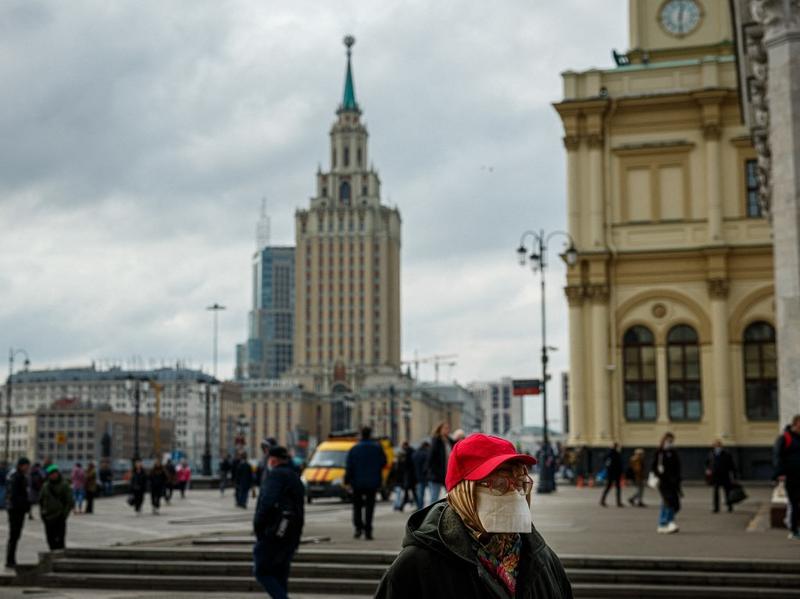 A woman wearing a face mask walks in Moscow on Oct 5, 2021. (DIMITAR DILKOFF / AFP)
A woman wearing a face mask walks in Moscow on Oct 5, 2021. (DIMITAR DILKOFF / AFP)
MEXICO CITY / TBILISI / RABAT / DUBLIN / SOFIA / MOSCOW / PARIS / KAMPALA / PRAGUE / BELGRADE / WARSAW - President Vladimir Putin ordered Russia’s most sweeping COVID-19 restrictions since May as the numbers of new infections and deaths during the pandemic reached record levels.
Putin approved a government proposal to declare Oct 30 to Nov 7 as “non-working days” in an effort to slow the spread of the virus in a televised meeting with officials Wednesday. The country’s worst-affected regions will be required to introduce the stay-at-home order from Oct 23.
Putin approved a government proposal to declare Oct 30 to Nov 7 as “non-working days” in an effort to slow the spread of the virus in a televised meeting with officials Wednesday. The country’s worst-affected regions will be required to introduce the stay-at-home order from Oct 23
“Now it is especially important to bring down the peak of a new wave of the epidemic,” said Putin, who issued an unusually impassioned plea for Russians to protect themselves by getting vaccinated.
He expressed dismay at low levels of vaccination among Russians despite the “difficult” COVID-19 situation. “I don’t understand what’s happening,” Putin said. “We have a reliable, safe vaccine.”
New daily infections have surpassed 30,000 in the past week for the first time since the crisis erupted last year, with deaths reaching a record high of 1,028 on Wednesday. While the government targeted an immunity rate of 80 percent in the fall, the actual level of the population who’ve either vaccinated or recovered from the virus is just over 45 percent, Deputy Prime Minister Tatyana Golikova told Putin.
The government proposed providing new loans and subsidies to small businesses hit by the restrictions. The president empowered regions to expand the number of non-working days, in which people will continue to receive their salaries, before or after the nationwide period.
The measures are not as strict as a lockdown, which the Kremlin has resisted in order to avoid the economic fallout, instead placing responsibility on regional officials to announce social restrictions to try to curb the spread of the virus.
EU
European Union countries are trying to reach agreement on ways to ease pandemic travel restrictions within and into the bloc as leaders work to boost COVID-19 vaccination levels.
One option under discussion ahead of a two-day EU summit in Brussels is a plan to effectively scrap the traffic-light system of green and red areas in the bloc that has been used to govern travel rules and instead allow anyone who has been vaccinated to travel freely, according to a European Commission informal proposal seen by Bloomberg.
The plan would rely on the use of the widely adopted EU digital Covid passports, which have allowed travelers to cross borders without tests or quarantines since the summer if they can show they’ve been fully inoculated or recovered from the virus. Travelers without a COVID-19 pass could be required to undergo tests after arriving in their destination.
“Given the very sizable impact on the exercise of free movement, persons traveling within the EU should in principle no longer be required to quarantine save for very exceptional situations (e.g. new variants of concern),” the European Commission proposal shows.
Other jurisdictions have begun to open up rapidly in recent weeks after a slower start, with the UK simplifying its own traffic light system to a green and red list, with the latter now featuring only seven countries as of last week.
The US, meanwhile, will admit vaccinated foreigners starting from Nov 8, spurring demand on transatlantic routes that rank as the most lucrative for airlines and travel firms.
A second option proposed by the commission would retain the traffic-light system, but refine the data used to produce the ratings. Member nations would be encouraged to implement simpler and more standardized rules for handling travelers from red or grey zones.
The commission proposal would also maintain the use of the so-called emergency brake mechanism to be used to case of new variants of concern or outbreaks, but would aim to establish a common framework for when new restrictions should be triggered.
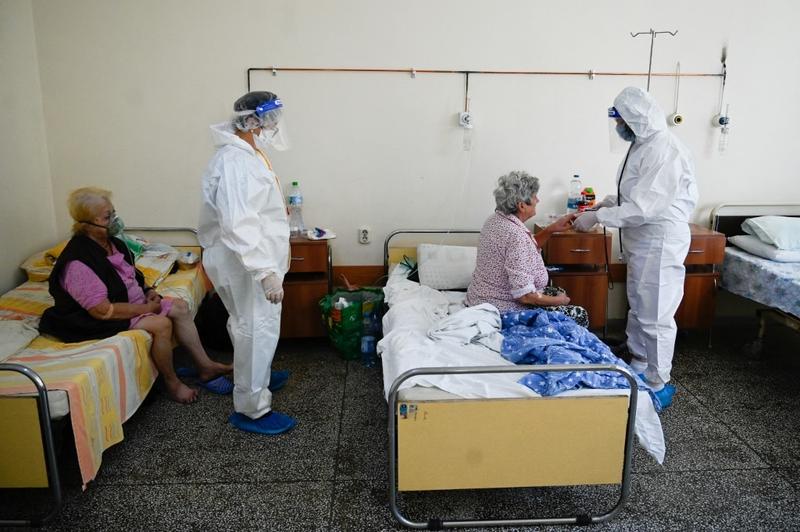 A doctor and a nurse examine patients at the COVID-19 unit of a hospital in Kjustendil on Oct 19, 2021, one of the municipalities in the 'dark Red COVID-19 zone' of Bulgaria, where more than 500 people out of every 100,000 are infected with coronavirus. (NIKOLAY DOYCHINOV / AFP)
A doctor and a nurse examine patients at the COVID-19 unit of a hospital in Kjustendil on Oct 19, 2021, one of the municipalities in the 'dark Red COVID-19 zone' of Bulgaria, where more than 500 people out of every 100,000 are infected with coronavirus. (NIKOLAY DOYCHINOV / AFP)
Bulgaria
The COVID-19 "Green Pass" will be mandatory for entering a number of indoor facilities in Bulgaria starting from Thursday, according to an order issued by the country's Health Minister Stoycho Katsarov Tuesday evening.
The "Green Pass" - a certificate that a person is fully vaccinated against COVID-19, has recovered from COVID-19 in the last six months or tested negative in the previous 48 hours or 72 hours depending on the test - will be necessary for anyone older than 18 to attend cultural and sports events.
The certificate will also be required to enter facilities such as eateries, swimming pools, fitness centers and shopping malls except those with grocery stores and pharmacies inside.
According to the order, the pass is also required for the staff of the hospitals and nursing homes, as well as for university staff and students.
According to the country's COVID-19 information portal, 4,979 new cases were registered in the last 24 hours, the second highest daily growth since the Balkan country reported its first COVID-19 case on March 8, 2020, bringing the total number to 545,598.
Meanwhile, Bulgaria's COVID-19 death toll has risen to 22,488 after 214 new deaths were reported in the past 24 hours. This is the third-highest daily death toll since the onset of the pandemic in the country.
France
The number of people hospitalized for COVID-19 in France went up for the third day in a row on Tuesday, a trend not seen for almost two months, according to French health authorities.
The number of hospitalizations rose by 15 people over 24 hours to 6,483. That is five times lower than the pandemic peak of 33,497 reported in November 2020.
But with the reproduction rate creeping above 1.0 again, and the virus still raging in some parts of Europe including Britain, some fear a fifth wave of the pandemic in France.
A reproduction rate above 1.0 indicates the pandemic is accelerating. As of Oct 16, the latest data available, the rate had reached 1.05 in France versus 0.71 at mid-September.
France registered 5,934 new confirmed cases over 24 hours, which marks a slight increase compared to a week earlier.
Georgia
Georgia on Tuesday reported 5,739 new COVID-19 cases, taking its total caseload to 670,552, according to official figures.
Data from the National Center for Disease Control and Public Health showed that 36 people died of COVID-19 in the last 24 hours, raising the death toll to 9,546.
Global tally
Coronavirus cases worldwide surpassed 241.67 million while the global death toll topped 4.91 million, according to data compiled by Johns Hopkins University.
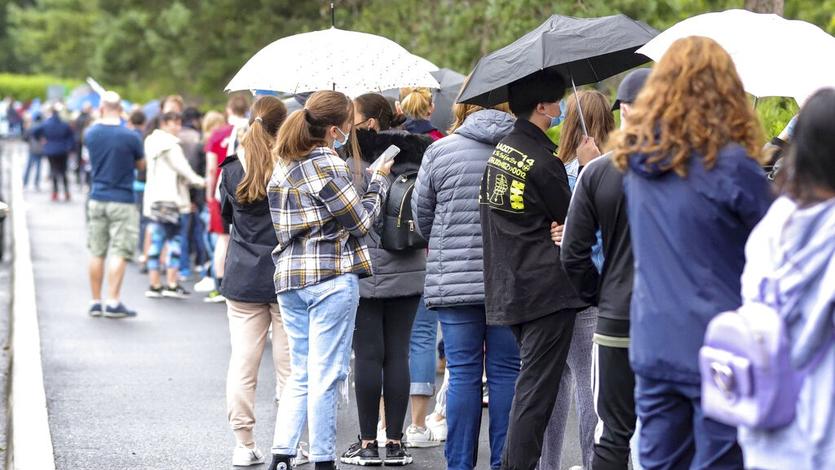 Parents and their children queue in rain outside the Citywest vaccination center, in Dublin on Aug 14, 2021. (DAMIEN STORAN / PA VIA AP)
Parents and their children queue in rain outside the Citywest vaccination center, in Dublin on Aug 14, 2021. (DAMIEN STORAN / PA VIA AP)
Ireland
The Irish government on Tuesday announced a number of new COVID-19-related rules for international travelers, which will take effect on Friday.
According to the new rules, people traveling into Ireland still have to show evidence of a valid PCR test result unless they have been fully vaccinated against COVID-19 or have recovered from the disease within the last six months or aged below 12.
A valid test result refers to the result of a test done within 72 hours prior to their arrival in Ireland.
Airlines have the obligation to check PCR test results and deny boarding to passengers who fail to provide acceptable documentation, said the government in a statement, adding that those who do not have a PCR test on arrival will be required to take a test within 36 hours of their arrival and present evidence to local police.
International travelers still need to complete an electronic Passenger Locator Form before their visit to Ireland, but they are no longer required to update their address of residence after arriving in the country, according to the statement.
According to the statement, the mandatory hotel quarantine system is no longer considered necessary and will be wound down and mandatory home quarantine requirements for international travelers will also be removed.
The new rules are part of the measures announced by the Irish government on Tuesday to further ease the COVID-19 restrictions in the country.
Starting from Friday, most of the COVID-19 restrictions in Ireland will be lifted. They include no requirement for capacity limits on outdoor events, no limits on the number of people attending weddings and religious services, and a gradual return to the workplace.
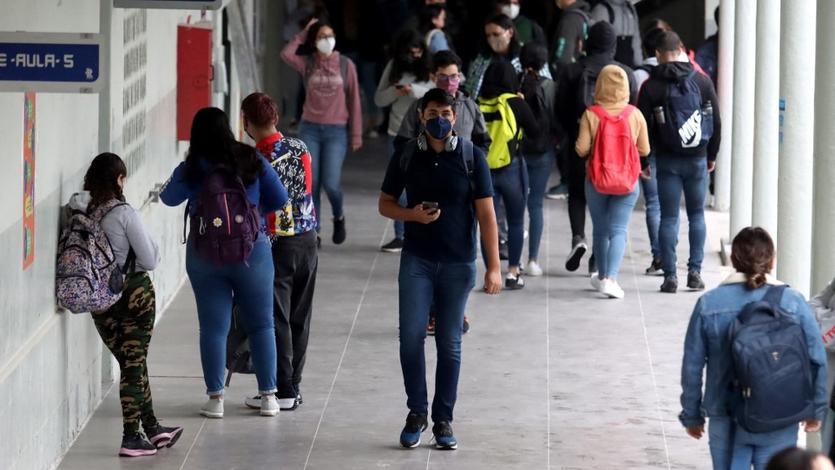 Students are seen at the Universidad de Guadalajara as in-person learning returns after being halted amid the COVID-19 pandemic in Guadalajara state, Mexico, on Oct 4, 2021. (ULISES RUIZ / AFP)
Students are seen at the Universidad de Guadalajara as in-person learning returns after being halted amid the COVID-19 pandemic in Guadalajara state, Mexico, on Oct 4, 2021. (ULISES RUIZ / AFP)
Mexico
Mexico could reach "the absolute minimum point" of COVID-19 spread next week, following 11 weeks of a sustained decline in new cases, Undersecretary of Prevention and Health Promotion Hugo Lopez-Gatell said on Tuesday.
Statistics of the current third wave of infections show a weekly 24-percent drop in new cases, the official said, while hospitalization of severe cases is 81 percent lower compared to the peak of the pandemic at the beginning of the year.
"If this continues next week, we will certainly be at the absolute minimum point of the epidemic," Lopez-Gatell told journalists at the National Palace in Mexico City.
Some 69.3 million Mexicans have been vaccinated against COVID-19, out of a base of 89.4 million people over 18 years of age, he said.
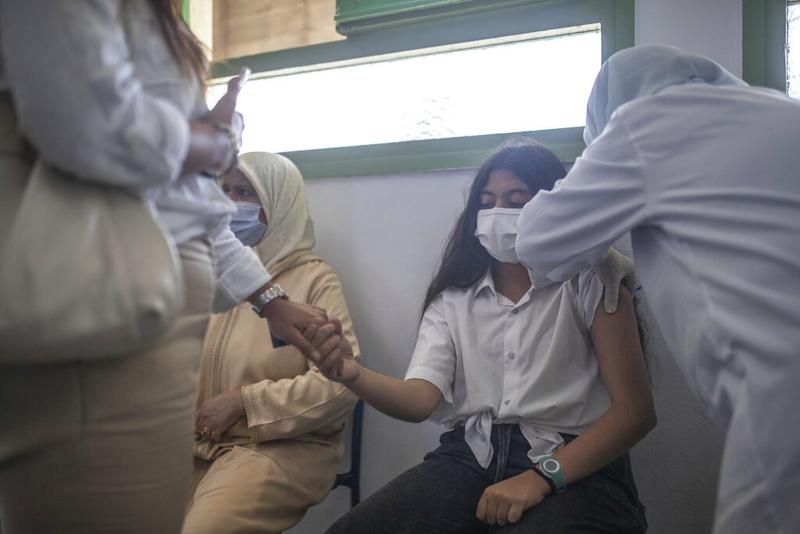 A girl holds her mother's hand while receiving her COVID-19 vaccine as Morocco launches a campaign to vaccinate 12-17 year olds before the start of the school year, in Rabat, Morocco, Aug 31, 2021. (MOSA'AB ELSHAMY / AP)
A girl holds her mother's hand while receiving her COVID-19 vaccine as Morocco launches a campaign to vaccinate 12-17 year olds before the start of the school year, in Rabat, Morocco, Aug 31, 2021. (MOSA'AB ELSHAMY / AP)
Morocco
Morocco has decided to adopt an obligatory COVID-19 vaccine pass from Oct. 21, official RIM radio reported Tuesday.
Officials, employees and users are required to show their vaccine pass to access public, semi-public and private administrations, according to a government statement.
The vaccine pass, which can be obtained after the second dose, will also be necessary for travels between cities and provinces through public and private transport, the report added.
The pass will also be required to enter hotels and tourist establishments, restaurants, cafes, shops, gyms and public baths, it said.
The government's statement also said that the vaccine pass will be a necessary document for traveling abroad.
Poland
Poland is facing an explosion of COVID-19 cases that may require drastic action, the health minister said on Wednesday, after the country reported more than 5,000 daily new infections for the first time since May.
Central Europe has seen a surge in COVID-19 cases over recent days, fueling fears that vaccination rates that are lower than in the west of the continent could fan a damaging fresh wave of infections.
"Over the last two days we have seen an explosion of the pandemic," Adam Niedzielski told a news conference. "We have increases from week to week of 85 percent and over 100 percent."
He said daily cases could be "well above" 5,000 next week.
"We will want to observe if this trend continues for a few days, and maybe we will have to take drastic measures," Niedzielski said, while adding that there was currently no discussion in government about imposing another lockdown.
Asked what he meant by "drastic" measures, Niedzielski said it would involve stricter enforcement of existing rules about wearing masks and practicing social distancing.
Poland's vaccination programme has slowed significantly in recent months, and lower case numbers have led many people to feel they can disregard the few restrictions still in place.
Niedzielski said both of these facts were contributing to the surge, as he urged Poles to get a COVID injection and follow the rules, for example by wearing masks in enclosed spaces.
The country of around 38 million people reported 5,559 new coronavirus infections and 75 deaths on Wednesday.
While this is well below the peak of the third wave in spring when cases topped 35,000, pushing the health service to the brink, it is more than double the number reported a week ago.
Since the beginning of the pandemic Poland has reported 2,950,616 cases of COVID-19 and 76,254 deaths.
Serbia
Serbia will make a COVID-19 "health pass" mandatory for access to restaurants, cafes and bars in the evenings, Prime Minister Ana Brnabic said on Wednesday, as the country struggles with persistently high numbers of coronavirus infections.
As of Oct 23, people who want to visit indoor cafes, hotels and restaurants after 10 pm, will need to show a pass - a digital or paper certificate showing someone has been vaccinated, tested negative or recovered from the virus.
Serbia, which has a population of 6.7 million, is struggling with a daily average of around 6,000 cases of COVID-19. So far, it has reported over 1 million confirmed cases of COVID-19 and 9,214 deaths.
"Epidemiological situation is still catastrophic and it is not calming down," Brnabic told a news conference in Belgrade.
"If someone is thinking about cheating this (health pass) ..., they can only cheat their own families, children, parents and grandparents and infect them," she said.
To curb spreading of coronavirus the country has already introduced mandatory wearing of masks indoors and maintaining physical distance, but many, including a number of high-ranking state officials are refusing to do so.
Last year, Serbia approved vaccines made by Pfizer/BioNtech, China's Sinopharm, AstraZeneca/Oxford University and Russia's Sputnik V for its inoculation programme.
But so far only around 50 percent of Serbia's population have received two shots, mainly due to strong anti-vaccine sentiment.
Slovakia
Slovakia reported 3,480 new COVID-19 cases on Oct 19, its highest daily tally since March 9, health ministry data showed on Wednesday.
Slovakia has one of the lower vaccination rates in the European Union, with just over half the adult population fully inoculated in the country of 5.5 million.
This has contributed to a faster rise in infections than in some neighbouring countries and cases have spiked since September.
Among new infections detected via PCR testing on Tuesday, 71 percent were unvaccinated, the ministry said. The number of patients in hospital rose above 1,000 for the first time since May - reaching 1,040, including 113 in intensive care.
Slovakia and other countries in central Europe are bracing for a new wave of the pandemic and governments are seeking to boost vaccinations, which also remain low in countries such as Romania where hospitals are under pressure.
In the neighbouring Czech Republic, which has a population twice as large as Slovakia's and a higher vaccination rate, the health ministry reported more than 3,000 new COVID-19 cases on Tuesday for the first time since April.
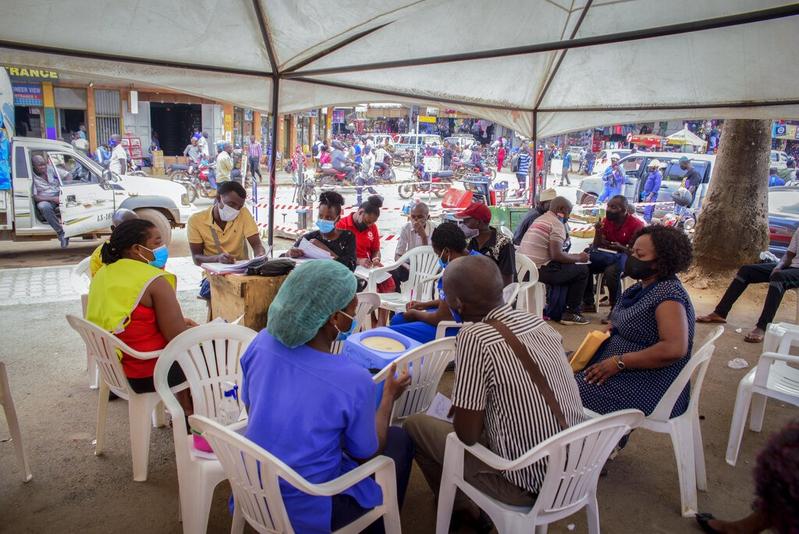 People wait to receive coronavirus vaccinations at a streetside vaccination tent in downtown Kampala, Uganda, Sept 7, 2021. (NICHOLAS BAMULANZEKI / AP)
People wait to receive coronavirus vaccinations at a streetside vaccination tent in downtown Kampala, Uganda, Sept 7, 2021. (NICHOLAS BAMULANZEKI / AP)
Uganda
Uganda on Tuesday received a second batch of Sinovac COVID-19 vaccines donated by the Chinese government.
Margaret Muhanga, the minister of state for primary health care, received the vaccines at the National Medical Stores in Entebbe, 40 km south of the capital Kampala.
She hailed the donation as her country is scaling up its vaccination campaign to save lives and open up the economy.
Zhang Lizhong, Chinese ambassador to Uganda, said the donation came at a time when the two countries marked the 59th anniversary of the establishment of diplomatic ties between them and is part of China's commitment to build a global community of health for all.
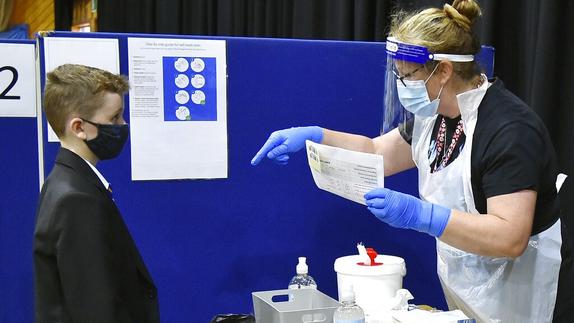 A boy at COVID-19 test station as he entered his new secondary school for the first time at Wales High school, Sheffield, England, Sept 3, 2021. (RUI VIEIRA / AP)
A boy at COVID-19 test station as he entered his new secondary school for the first time at Wales High school, Sheffield, England, Sept 3, 2021. (RUI VIEIRA / AP)
UK
British hospitals are on the edge and people should wear masks and come forward for vaccines to stop them being overwhelmed by a rising wave of COVID-19 cases, senior medical figures said on Wednesday, as the government resisted calls for new measures.
Britain has the eighth biggest death toll globally from COVID-19, with nearly 139,000 fatalities. But it also had a quick start to its vaccine programme and Prime Minister Boris Johnson has lifted almost all COVID-19 restrictions in England, ending social distancing measures and mask mandates.
Johnson's government has said that it is relying on vaccinations, including booster shots for the vulnerable, to avoid lockdowns during a bumpy winter, having previously shut down the economy three times.
But the vaccine rollout has stalled, slipping behind several other European countries, while a booster programme is off to a slow start.
"COVID-19 cases are rising and winter is drawing closer. If you have not been vaccinated, now is the time. If you are offered a booster please take up the offer," Chief Medical Officer Chris Whitty said.
"Ventilation, masks in crowded indoor spaces and hand washing remain important."
Doctors have expressed concern that an increase in numbers going into hospital, combined with pressures on the NHS from seasonal viruses, could leave hospitals unable to deal with long waiting lists and function normally.
Matthew Taylor, Chief Executive of the NHS Confederation, called for measures that Johnson is holding in reserve such as mask-wearing and working from home.
"I talk to health leaders every day, and I have literally not spoken to any leader who doesn't say that their service is under intense pressure now. This is the middle of October. Things are only going to get worse," Taylor told BBC radio.
"The health service is right at the edge... if you push much further we will not be able to provide the level of service that people need to have."
Business minister Kwasi Kwarteng said another lockdown would be wrong and also played down the prospect that more limited measures would be brought in soon.
"Ministers, scientists, experts are looking at data on an hourly basis," he told the BBC. "And we don't feel that it's the time for Plan B right now."
A parliamentary report into Britain's response in the early stages of the pandemic said last week that delaying a lockdown and other failures had caused thousands of avoidable deaths.
Britain reported 223 new deaths from COVID-19 on Tuesday, the highest daily figure since March, and cases are the highest in Europe.
Britain's quick start with vaccines also mean that immunity could be waning in those vaccinated first.
Andrew Pollard, the head of the Oxford Vaccine Group, said the risk was mainly in the unvaccinated.
"(Boosters) may have some at least initial downward pressure on the transmission that we're seeing at the moment," he told BBC radio.
"But...the biggest issue for intensive care is not the highly vaccinated individuals, it remains the unvaccinated."
He added that a subvariant of Delta that is growing in England was unlikely to change the picture.
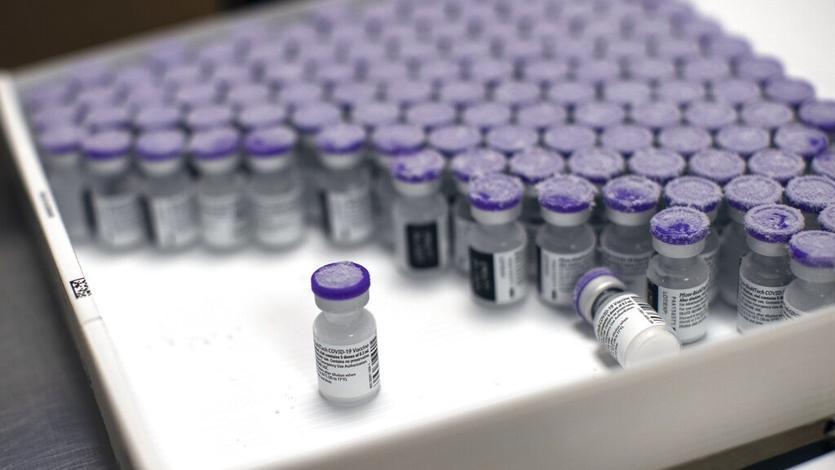 In this Jan 4, 2021 file photo, frozen vials of the Pfizer-BioNTech COVID-19 vaccine are taken out to thaw at the MontLegia CHC hospital in Liege, Belgium. (FRANCISCO SECO / AP)
In this Jan 4, 2021 file photo, frozen vials of the Pfizer-BioNTech COVID-19 vaccine are taken out to thaw at the MontLegia CHC hospital in Liege, Belgium. (FRANCISCO SECO / AP)
United States
The Pfizer Inc/BioNTech SE COVID-19 vaccine was 93 percent effective in preventing hospitalizations among those aged 12 to 18, according to an analysis released by the US Centers for Disease Control and Prevention (CDC) on Tuesday.
The study was conducted between June and September, when the extremely contagious Delta variant of the coronavirus was predominant.
Yet, the data from 19 pediatric hospitals showed that among the 179 patients who were hospitalized for COVID-19, 97 percent were unvaccinated, providing reassurance of the vaccine's efficacy.
Of the roughly 16 percent of patients hospitalized with severe enough COVID-19 to require life support, none were vaccinated.
The CDC report builds on trials done by the companies in this age group that showed high immune response against the virus, but which were not designed to demonstrate efficacy against hospitalization.
Separately, the US Food and Drug Administration is expected to soon recommend that persons 40 and older receive a Pfizer or Moderna COVID-19 booster shots, CNN reported on Tuesday.


